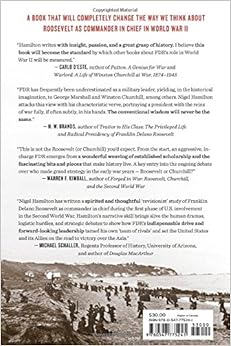A popular biographer of various twentieth-century leaders, Hamilton here addresses a seemingly exhausted subject. Not so, he avers. FDR’s leadership as commander-in-chief is a space Hamilton offers to fill with this work. The first of two projected volumes, it chronologically extends from FDR’s August 1941 meeting with Churchill to the November 1942 Allied landings in French North Africa. Thematically, Hamilton depicts FDR’s assertion of his authority over American army and navy chiefs and, increasingly over time, Churchill. Palpably gleeful when pinpointing unflattering episodes these figures omitted from their memoirs, Hamilton is tantamount to the amanuensis for the memoir FDR never wrote. The portrait that emerges is complimentary and praises FDR as a strategist superior both to fellow Allies and to Axis enemies. He insisted MacArthur fight in the Philippines, he rejected British requests to defend India, he refuted his military officers’ proposals to invade France and to concentrate on Japan, and he ordered them to carry out Operation Torch, the North African invasion. Well researched and confident in its conclusions, Hamilton’s study ably augments the gallery of WWII leaders. --Gilbert Taylor
Review
"
The Mantle of Command is splendid: It’s the memoir Roosevelt didn’t get to write."
—
New York Times Book Review "Masterly."
—
Wall Street Journal
"FDR has frequently been underestimated as a military leader, yielding, in the historical imagination, to George Marshall and Winston Churchill, among others. Nigel Hamilton attacks this view with his characteristic verve, portraying a president with the reins of war fully, if often subtly, in his hands. The conventional wisdom will never be the same."
—H.W. Brands, author of Traitor to His Class: The Privileged Life and Radical Presidency of Franklin Delano Roosevelt
"Nigel Hamilton’s Mantle of Command is a stirring and noteworthy book about Roosevelt’s crucial role as commander-in-chief during World War II. Hamilton writes with insight, passion, and a great grasp of history. I believe this book will become the standard by which other books about FDR’s role in World War II will be measured." — Carlo D’Este, author of Patton: A Genius for War and Warlord: A Life of Churchill at War, 1874–1945
"This is not the Roosevelt (or Churchill) you'd expect. From the start, an aggressive, in-charge FDR emerges from a wonderful weaving of established scholarship and the fascinating bits and pieces that make history live. Churchill is an inspirational nag, with a busy, unfocused strategic vision. A key entry into the ongoing debate over who made grand strategy in the early war years — Roosevelt or Churchill?" — Warren F. Kimball, author of Forged in War: Roosevelt, Churchill, and the Second World War
"Nigel Hamilton in Mantle of Command presents a very different wartime Franklin Delano Roosevelt than the one we are used to seeing. Whether or not one agrees with all his conclusions, Hamilton clearly shows that FDR was an extremely strong and effective commander-in-chief. This volume should go a long way to dispelling popular myths about Roosevelt as a naïve and weak war leader."
— Mark Stoler, editor of the George C. Marshall Papers & Professor Emeritus of History, University of Vermont
"Nigel Hamilton has written a spirited and thoughtful ‘revisionist’ study of Franklin Delano Roosevelt as commander-in-chief during the first phase of U.S. involvement in the Second World War. Hamilton’s narrative skill brings alive the human dramas, logistic hurdles, and strategic debates to show how FDR’s indispensable drive and forward-looking leadership tamed his own ‘team of rivals’ and set the United States and its Allies on the road to victory over the Axis. The books enlivens the often murky worlds of bureaucratic struggle and military detail to demonstrate how important it was for the United States to ‘get it right’ early in the war and how FDR accomplished this."
—Michael Schaller, author of Douglas MacArthur & Regents Professor of History, University of Arizona








